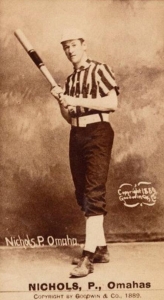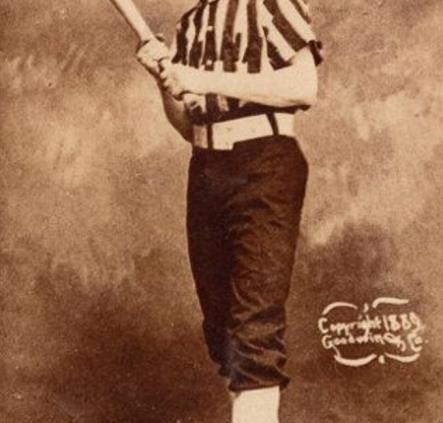October 13, 1899: Kid Nichols’ masterful 3-hitter caps 10 straight seasons with 21-plus victories
 For 10 straight seasons, one pitcher in the National League was the model of winning consistency: Kid Nichols. During the decade of the ’90s (1890s, that is), Nichols won 297 games for the Boston Beaneaters. On October 13, 1899, he won his final game of the decade, marking a record of at least 21 victories per season for 10 consecutive years, causing the Boston Globe to headline its account of the game, “Nichols Pitches Best Game of Ball That Has Been Seen for Long Time.”1
For 10 straight seasons, one pitcher in the National League was the model of winning consistency: Kid Nichols. During the decade of the ’90s (1890s, that is), Nichols won 297 games for the Boston Beaneaters. On October 13, 1899, he won his final game of the decade, marking a record of at least 21 victories per season for 10 consecutive years, causing the Boston Globe to headline its account of the game, “Nichols Pitches Best Game of Ball That Has Been Seen for Long Time.”1
The Beaneaters’ right-hander faced off against southpaw Wiley Piatt and the Philadelphia Phillies on the next-to-last day of the season, before a Boston home crowd of about 1,100. This was billed as “the decisive game of the season,”2 and a “grand game played by crackerjacks, one playing for shekels and the defeated champions still fighting for second place”3 in the National League. Boston, at 94-56-1, was one game ahead of Philadelphia (93-57-2). The Phillies owner had offered the team $2,500 for a second-place finish.4 The Philadelphia Inquirer called the outcome “one of the most stubbornly contested and brilliantly played games ever played on the Boston or any other diamond.”5 Nichols had won his 20th game on October 4, by a score of 6-4 over the New York Giants, but he lost his next start (the one prior to this game). In 1898, Piatt, playing in his rookie season, had won 24 games for Philadelphia, and he was trying to match that total in this game.
In this masterpiece, Nichols struck out five and walked only one. He displayed “fine speed, sharp curves and a jump to his high ball.”6 All three hits he allowed were singles. His opponent, Piatt, allowed only four hits and no walks. Of the two pitchers, “Nichols was hit far the harder, even if the ball did not roll safely.”7 A few fly balls lingered in the air, aided by the wind, permitting Beaneaters outfielders to catch them.
In the bottom of the sixth inning, Marty Bergen batted with one out and hit a solid double into right field. After Nichols grounded out, Bergen came around to score on a single by Billy Hamilton, who “picked out a good one and shot it past [shortstop Monte] Cross.”8 Hamilton was caught stealing to end the inning. In eight other innings, Boston would get only two other baserunners to second base.
The Phillies had two chances to put a run on the board, and the first came in the fourth inning. Cross drew a base on balls from Nichols, the only free pass of the game, and advanced to second on a sacrifice by Ed Delahanty. A passed ball permitted Cross to scamper to third. Nichols bore down and struck out Pearce Chiles and Nap Lajoie. The Phillies were then retired in order for four straight innings, but in the ninth, with one out, Elmer Flick singled to center and was forced out at second on a grounder by Cross. That brought up Delahanty, the “leading batsman in the league,”9 who singled to right field, enabling Cross to motor to third. Delahanty stole second base, and suddenly the Phillies had runners at second and third. Chiles stepped into the batter’s box, and after working the count to 2-and-2, he stepped out, called out on strikes. The game was over and Nichols and Boston had secured a 1-0 victory.
The Beaneaters finished the 1899 campaign by winning 14 of their last 20 games, but it was not enough to catch the Brooklyn Superbas, and Boston ended up eight games back, in second place in the National League. Even though they lost the final game of the season, 6-1, to the Phillies, Boston still held a one-game advantage over Philadelphia in the final standings.
The Globe wrote that “Charlie Nichols pitched a phenomenal game and was given grand support by the champions.”10 He retired the Phillies in order in six of the nine innings. Nichols had been the star of the Beaneaters for 10 years. As a 20-year-old rookie, he won 27 games and led the league in shutouts with seven. From 1896 to 1898, he won 91 games to lead the league each season in victories. His winning percentage was .663 for this decade. In his first 10 years with Boston, the future Hall of Famer averaged 49 starts and 400 innings pitched per season.11 Even though the mark of 21 wins seems low in comparison to other seasons, Nichols’ ERA of 2.99 was admirable. Further, “Boston’s daily newspapers tended to write off his low winning percentages as simple misfortune.”12
Sources
In addition to the sources mentioned in the Notes, the author consulted baseball-reference.com and retrosheet.org. The author sincerely thanks Lisa Tuite of the Boston Globe for her assistance with providing sources.
Notes
1 “Shut Out Again,” Boston Globe, October 14, 1899: 16.
2 “Phillies Outlucked: Great Pitchers Battle,” Philadelphia Inquirer, October 14, 1899: 7.
3 “Shut Out Again.”
4 “Phillies Outlucked.”
5 Ibid.
6 “Shut Out Again.”
7 “Phillies Outlucked.”
8 “Shut Out Again.”
9 Ibid. In 1899, future Hall of Famer Delahanty led the league in average (.410), hits (238), doubles (55), runs batted in (137), and slugging percentage (.582), as well as OPS (1.046).
10 Ibid.
11 From 1890 to 1999, Nichols pitched 3,996⅔ innings.
12 Rich Bogovich, “Kid Nichols,” sabr.org/bioproj/person/2ad88b62.
Additional Stats
Boston Beaneaters 1
Philadelphia Phillies 0
South End Grounds
Boston, MA
Corrections? Additions?
If you can help us improve this game story, contact us.


